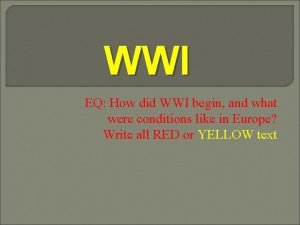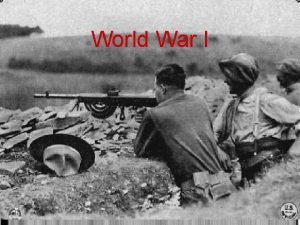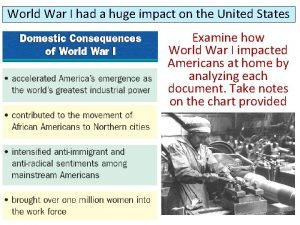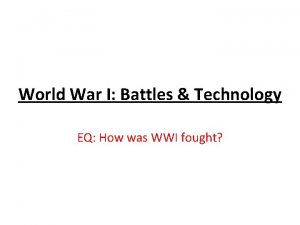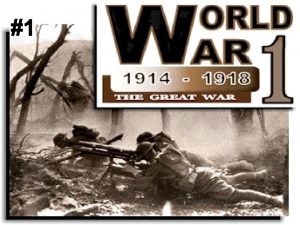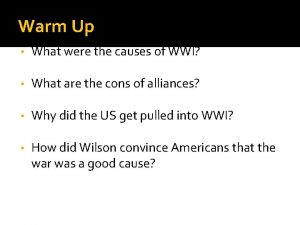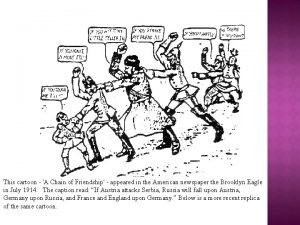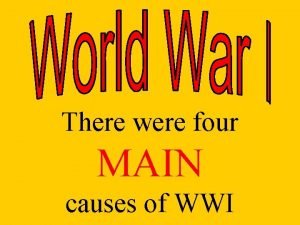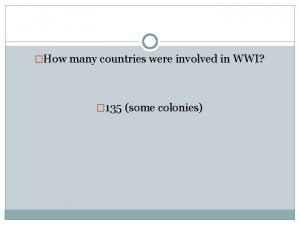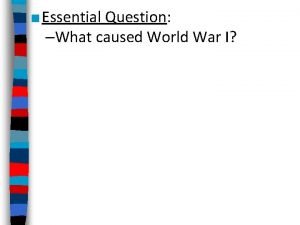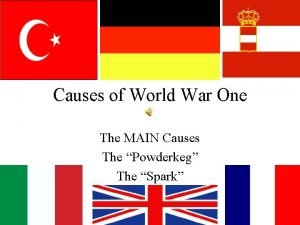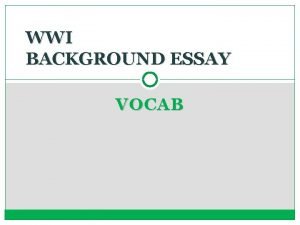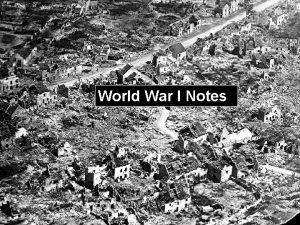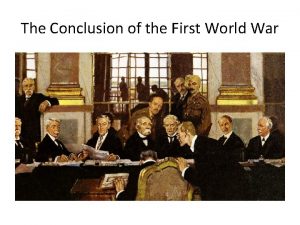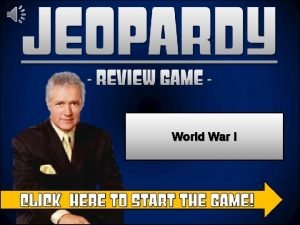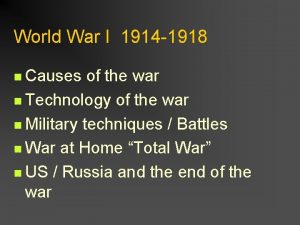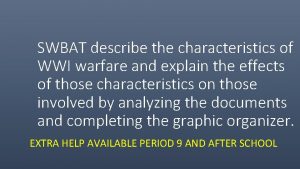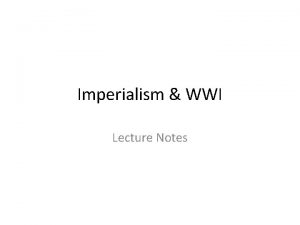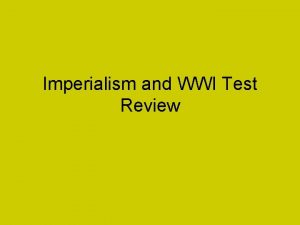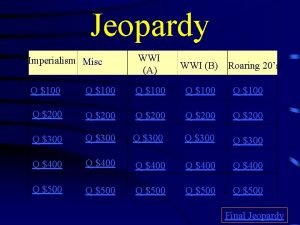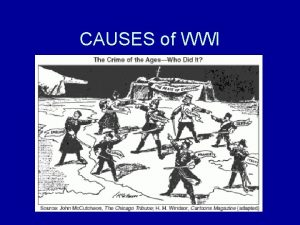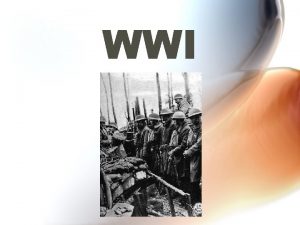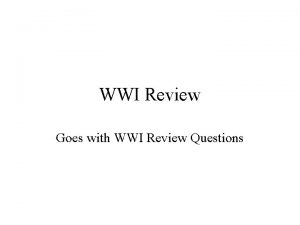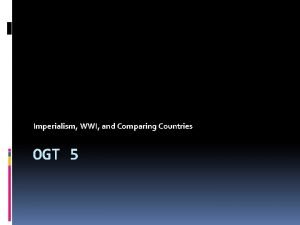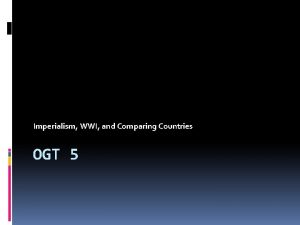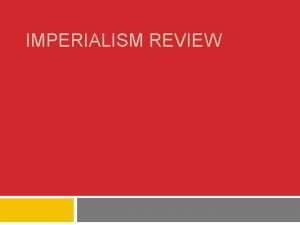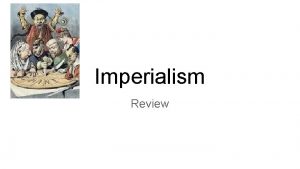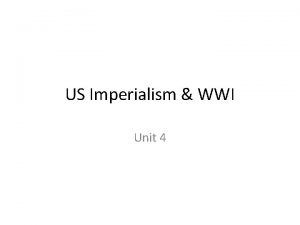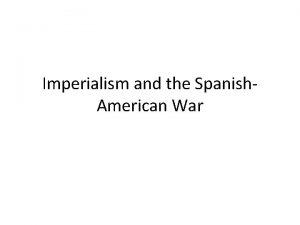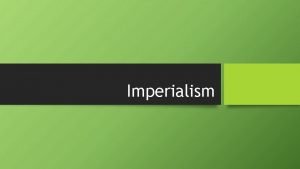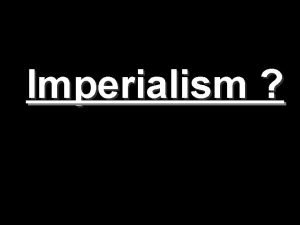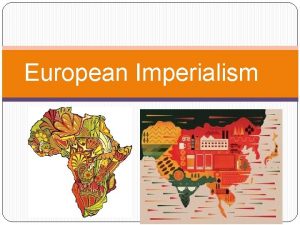WWI and Imperialism A Review For Imperialism On






















- Slides: 22

WWI and Imperialism A Review

For Imperialism: On the map, be able to locate the country that is being talked about in the statement, and know the “story” for the vocab terms…

In which country did the Boxer Rebellion occur, trying to rid it of foreigners, and forcing international intervention to keep trade open?

Over which country did the US fight Spain to gain their independence, though we still took partial control of after the war?

Which country did the US purchase for $20 million as part of the Treaty of Paris, 1898, and had to fight a rebellion in after?

In which area did the US help the country gain independence so we could build a passage to speed up trade?

Which territory did the US gain for a naval base and sugar plantations, by helping to overthrow a queen?

Which territory did the US gain from the Treaty of Paris that wanted to become a US state?

For the next part of the review (PASSWORD): In tables, have one set of students facing front, one set facing back (nobody in side chairs) The students facing front will use their notes and give the students facing back clues, related to the war, that will get their partners to say the terms. Once one slide is done, switch sides!!

Imperialism Terms Yellow Journalism USS Maine De. Lome Letter Rough Riders Protectorate Platt Amendment Treaty of Paris (4 things we got out of it!)

Imperialism Terms Yellow Journalism – exaggerating news to get readers – journalists wrote that Spain was butchering Cubans, made Americans feel sympathy toward Cuba USS Maine – ship sent to Cuba to pick up Americans – was blown up, and blamed on Spain. “Remember the Maine” became the rallying cry for war against Spain. De. Lome Letter – written by Spanish minister, criticized president Mc. Kinley. When published in the papers, made Americans angry at Spain. Rough Riders – volunteer cavalry that fought in Cuba against Spain – let by men like Theodore Roosevelt Protectorate – A country whose affairs are partially controlled by another – US’ relationship towards Cuba and Puerto Rico after the Spanish-American War Platt Amendment – US forcing Cuba to amend its constitution so the US could intervene in their foreign affairs and put a naval base there – helped US keep control of Cuba after Spanish-American War Treaty of Paris – ended Spanish-American war – Spain gave Cuba independence, US gained Puerto Rico and Guam, bought Philippines for $20 million

WWI – Long Term Causes MAIN causes of WWI – be able to list and explain Militarism Alliance System Imperialism Nationalism

WWI – Long Term Causes MAIN causes of WWI Militarism – build up of military for safety, and diplomacy – help build and maintain empires (Germany) Alliance System – meant to make countries peaceful, but instead makes any war larger. Triple Alliance, Triple Entente Imperialism – build up of empires around the world leads to competition – Germany competing with Britain and France Nationalism – belief in the superiority of your own nation, culture, language, etc. Russia helped the Serbians due to their Slavic heritage

Leaders Kaiser Wilhelm II Woodrow Wilson Vladimir Lenin (overthrew Czar Nicholas II) Archduke Franz Ferdinand

Leaders Kaiser Wilhelm II – leader of Germany, blamed for the war Woodrow Wilson – president of the US, had 14 point plan for peace Vladimir Lenin (overthrew Czar Nicholas II) – leader of the Bolshevik party in Russia, overthrew the Czar to give government back to the people Archduke Franz Ferdinand – assassinated in Bosnia, becoming the “SPARK” leading to war between Austria-Hungary and Serbia

Alliances – be able to name the countries Triple Alliance (Germany, Austria-Hungary, Italy) Central Powers (Germany, Austria-Hungary, Ottoman Empire, Bulgaria) Triple Entente (France, Great Britain, Russia) Allied Powers (France, Great Britain, Italy, Russia, USA, Serbia, Romania, Greece, Montenegro – need to know at least the first 5!!)

Fighting the War Total War Trench Warfare Christmas Truce 1914 Submarines **Be able to describe the challenges of trench warfare! “No Man’s Land” Trench Foot Dysentery Shell Shock (battle fatigue) Mustard Gas New Technologies (have them list at least 4 types, such as machine guns, tanks, airplanes, flame throwers, submarines, gas, etc. )

Fighting the War Total War – war involving more than just military troops, includes attacking civilians, the economy, political structure, etc. Trench Warfare – type of fighting done in WWI, digging in to defend your self. Ran from Belgium to Switzerland. Christmas Truce 1914 – cease-fire in the trenches between British/French/Belgian and German troops at the beginning of the war – still viewed the enemy as human.

America at War 3 things that brought us into war Zimmerman Note U-boats (Lusitania) End of Russian monarchy Selective Service Act (draft) Influenza Epidemic

America at War 3 things that brought us in Zimmerman Note (proposed alliance between Germany & Mexico, intercepted by US) U-boats (Lusitania and other ships sunk by German uboats) End of Russian monarchy (semi-democracy vs. monarchy) Selective Service Act (draft) – men had to register, pulled 3 million to fight right away Influenza Epidemic – 1918, killed 30 million worldwide, including 500, 000 Americans – far more deadly than the war, spread due to soldiers traveling for the war more than anything

Treaty of Versailles Armistice (when? ) Fourteen Points League of Nations Reparations War-guilt Clause Legacy of the War (what changed that won’t go back to “normal”) Who was invited, and who wasn’t

Treaty of Versailles Armistice (when? ) – cease fire, 11: 00, November 11, 1918 Fourteen Points – Wilson’s plan for peace, re-draw boundary lines, free trade, League of Nations – gathering of nations to discuss and help with disputes between nations before they lead to war Reparations – amount of $ Germany had to pay to the allies for the war - $33 billion War-guilt Clause – Germany forced to sign, claiming sole responsibility for the Great War Legacy of the War (what changed that won’t go back to “normal”) – presidential powers, women’s and black’s roles, hatred from propaganda Who was invited (Great Britain, France, USA, and Italy), and who wasn’t (any of the Central Powers, Russia, all of the smaller nations that fought)
 Imperialism in 1900
Imperialism in 1900 How were old imperialism and new imperialism similar?
How were old imperialism and new imperialism similar? Africa 1890
Africa 1890 Italian gains in ww1
Italian gains in ww1 Ww1 webquest answer key
Ww1 webquest answer key Wwi sides
Wwi sides Main causes of ww1
Main causes of ww1 Impact of wwi
Impact of wwi New technology in wwi
New technology in wwi Causes of wwi (mania)
Causes of wwi (mania) World war i combatants
World war i combatants Chain of friendship cartoon meaning
Chain of friendship cartoon meaning Simulateries
Simulateries How many countries were involved in wwi
How many countries were involved in wwi Militarism
Militarism Cause of ww1
Cause of ww1 Wwi background
Wwi background Mania in ww1
Mania in ww1 Conclusion of world war 1
Conclusion of world war 1 World war 1 jeopardy
World war 1 jeopardy Weapons of wwi
Weapons of wwi Nationalism wwi
Nationalism wwi Wwi
Wwi



